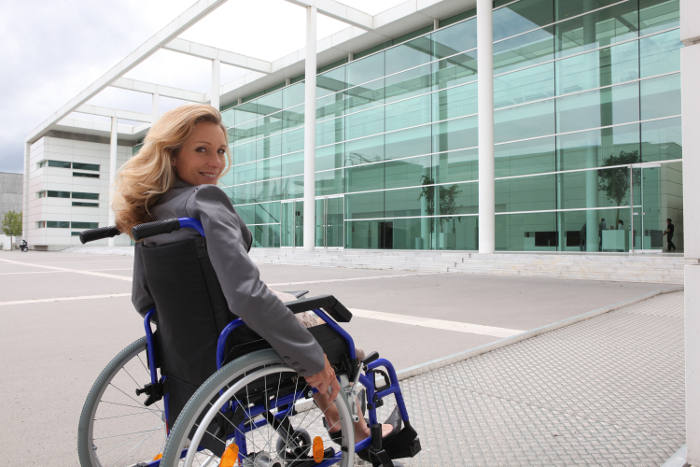
From KioskIndustry Jan2022
Thanks to William Goren and //www.understandingtheada.com/ — From updated Kiosk Accessibility: The Law is Paying Attention
Quest Diagnostics Update + Walmart Blind Access
In Brief
- Court rejected Quest request to dismiss ACB suit. It is moving ahead
- Quest has already conceded “effective communication” not provided
- Class action enabled which means corrective measures would need to be done across the country.
December 31, 2021 Update
The American Council of the Blind’s lawsuit against Quest Diagnostics about the companies inaccessible kiosks continues, with new rulings that allow the case to continue. First, in September 2021, Quest asked the Court to rule that Quest’s kiosks did not violate the ADA. On October 15, 2021, the Court rejected Quest’s request, finding that Quest’s kiosks are a part of the service that Quest provides. Because of that, Quest must provide what is legally referred to as “auxiliary aids and services” to render the kiosks accessible to blind patients.
Auxiliary aids and services are methods that allow a company to effectively communicate with its blind or deaf customers. In this case, auxiliary aids and services would make the visually delivered content and features of the kiosks usable by people who cannot see. The parties can still fight over the precise methods, but this is a big win for the plaintiff to move the case forward. (The judge even found that Quest has conceded that its kiosks, as originally developed, did not provide “effective communication” with blind individuals.)
In a different court order in December, 2021, the court certified a class of blind people, meaning the case can go forward as a class action on the issue of fixing the kiosks. In the class action ruling, the court wrote that “This is a civil rights action against a party charged with unlawful, class-based discrimination based on the use of a specific auxiliary aid or service, and is a prime candidate for certification.” By certifying a nationwide class of blind Quest customers, the court has expressed its opinion that modifications to Quest’s kiosks must be made at all locations across the country.
October 18, 2021 Update
Updated to include a link to an article on this website about a U.S. court opinion in the case about Walmart self-check kiosks. On October 12, 2021 a federal judge ruled that Walmart was not required under the ADA to make its kiosks usable by blind people. Read the article about the Walmart kiosk case, U.S. Federal Judge Rules for Walmart, against Blind Shoppers, in Self-checkout Kiosk Case
October 10, 2021 Update
(1) Updated the Healthcare Kiosks section of this article to include United States Department of Justice activity supporting a lawsuit about healthcare kiosk accessibility. (2) Updated the Restaurant Kiosks section to include McDonald’s commitment to accessible kiosks.
Other Items of Note
Restaurant Kiosks: Blind People Eat Out (and Pay) Too
McDonald’s works with NFB to improve kiosk accessibility
In May, 2021, the Kiosk Manufacturers Association published an article titled McDonald’s Kiosks and National Federation of the Blind Collaborate. The article explained that:
Using new and advanced technology, enhancements to existing accessibility features include screen-reading software, tactile keypads and the ability for customers to connect their headphones or ear buds to the kiosk and independently place their orders by responding to audio prompts.
No lawsuit was needed in the effort with McDonald’s.
Structured Negotiation improves Applebee’s kiosks>
In January, 2018 the National Federation of the Blind announced a partnership with a major manufacturer of table-top tablets increasingly used in restaurants for ordering, payment and more. The partnership will “produce a text-to-speech capability for the PrestoPrime EMV System that will be incorporated into all current and future Presto tablets, including those used in Applebee’s Grill + Bar restaurants nationwide.” The settlement agreement outlining the details shares that the parties used Structured Negotiation to reach agreement. Download the settlement agreement from the case announcement.
The new functionality will enable “blind persons to interact with the Presto System.”
Talking ATMs: Accessible Financial Technology Still Needed Around the World
Talking ATMs have shown since 1999 that financial kiosks must — and can be — accessible. In the United States the Americans with Disabilities Act has long required that ATMs talk, and advocates made that law a reality with significant numbers of Structured Negotiations and some lawsuits in the late 1990’s and throughout the 2000s.
But financial technology is global, and accessibility must be global too. Last month came news of the first Talking ATMs in the United Arab Emirates. The machines spoke in Arabic and English, and the Braille was in two languages too.
But the devices were manufactured by Diebold – one of the early Talking ATM manufacturers in the United States. What took so long for Talking ATMs to get to the UAE?
That country ratified the UN Convention on the Rights of People with Disabilities in 2008. Accessible technology is embedded in the Convention. Manufacturers should not be shipping financial technology (#FinTech) without access. The UNCRPD must be implemented to ensure technology remains available to disabled people.
[Curious about the history of Talking ATMs? Visit the Talking ATM topic page on this website for more than 60 posts about this bedrock of accessible financial industry technology.
